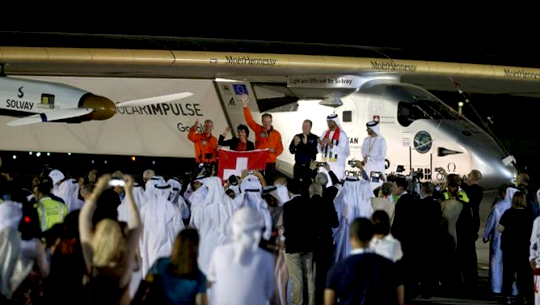Abu Dhabi, Jul 26: Solar Impulse 2 landed today in the UAE, completing its epic journey to become the first sun- powered airplane to circle the globe without a drop of fuel to promote renewable energy.

The plane touched down at 04:05 (0535 IST) in the capital Abu Dhabi after a more than 48 hour-long flight from Cairo, the final leg in its journey which began on March 9 last year.
Cheers and clapping welcomed the plane as it arrived at Al-Bateen Executive Airport, where it first launched its world tour, an AFP journalist reported.
Swiss explorer and project director Bertrand Piccard was in the cockpit during the 2,763 kilometre flight from Cairo, crossing the Red Sea, the vast Saudi desert and flying over the Gulf.
The flight capped a remarkable 42,000-kilometre journey across four continents, two oceans and three seas.
Solar Impulse 2 took off from Cairo on the final leg early on Sunday, having previously crossed Asia, North America, Europe and North Africa.
"The future is clean, the future is you, the future is now, let's take it further," said Piccard as he disembarked.
"One thing I would like for you to remember: More than an achievement in the history of aviation, Solar Impulse has made an achievement in (the) history of energy," he said.
"We have enough solutions, enough technologies. We should never accept the world to be polluted only because people are scared to think in another way."
Dubbed the "paper plane", Solar Impulse 2 has been circumnavigating the globe in stages, with 58-year-old Piccard and his compatriot Andre Borschberg taking turns at the controls of the single-seat aircraft.
Borschberg, 63, smashed the record for the longest uninterrupted journey in aviation history with the 8,924- kilometre flight between Nagoya, Japan and Hawaii that lasted nearly 118 hours.
"The adventure began 13 years ago... #futureisclean," he tweeted yesterday.
No heavier than a car but with the wingspan of a Boeing 747, the four-engine, battery-powered aircraft relies on around 17,000 solar cells embedded in its wings.
The plane has clocked an average speed of 80 kilometres an hour.
The pilots use oxygen tanks to breathe at high altitude and wear suits specially designed to cope with the extreme conditions.
They have had to withstand temperatures inside the tiny cockpit ranging from minus 20 degrees to plus 35 degrees Celsius.
Piccard has said he launched the project in 2003 to show that renewable energy "can achieve the impossible".





Comments
Add new comment